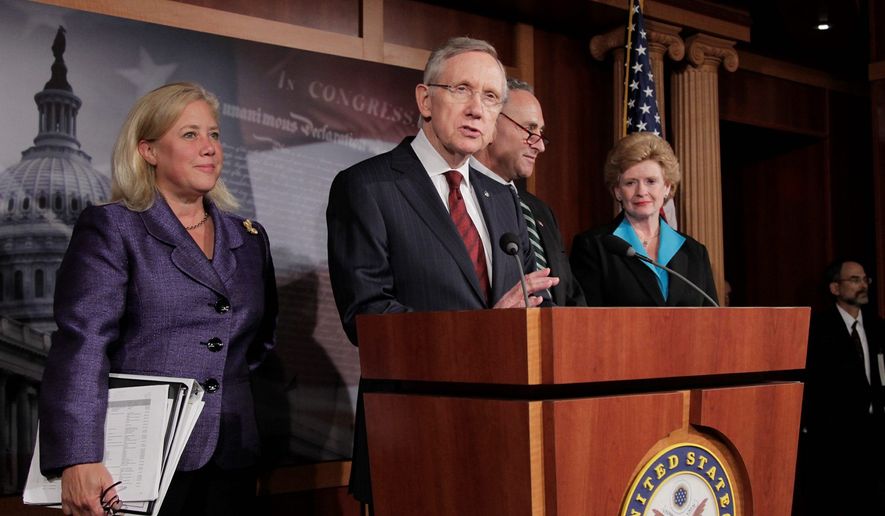The Senate passed a stopgap spending bill Monday night to avert a potential government shutdown after the Obama administration discovered it had enough money in its disaster accounts to last through the end of this month, leaving lawmakers with “nothing to fight about.”
For the past two weeks, Republicans and Democrats have been sparring over how to replenish the Federal Emergency Management Agency’s accounts, which all sides thought were going to run dry before Friday - the end of fiscal 2011. Republicans insisted any new money needed to be matched by cuts elsewhere, while Democrats said such emergency money always has been tacked onto the deficit.
But Monday’s announcement that FEMA still had $114 million to last through Friday removed the need for an emergency injection.
“Let’s fight when there’s something to fight about. There’s nothing to fight about tonight,” said Senate Majority Leader Harry Reid, Nevada Democrat.
Instead, the Senate passed two “clean” short-term spending bills - one which lasts through Oct. 4, and the other through Nov. 18. The House, whose members are on vacation, is expected to pass the Oct. 4 measure by voice vote later this week and then vote on the longer-term bill when the full House returns next week.
Senate Minority Leader Mitch McConnell, Kentucky Republican, said Monday’s action was “vindication of what Republicans have been saying all along: before we spend the taxpayers’ money, we should have a real accounting of what’s actually needed.”
The Senate voted 79-12 to approve the deal, with all the “no” votes coming from Republicans.
Sen. Dean Heller, a freshman Nevada Republican who opposed the deal, said it embraced too much spending next year.
“Once again, Congress scrambled to solve a problem that should have been addressed earlier in the year with a long-term budget,” Mr. Heller said. “This is just another stopgap measure that adds to the federal deficit without a long-term plan to get our country on the path to fiscal responsibility.”
Still, the GOP’s leaders said the bill marks a victory for lower spending and Michael Steel, a spokesman for House Speaker John A. Boehner, said the Democrats’ bill would have been more expensive.
“Republicans stood firm, and Senate Democrats have conceded that the spending level in the House-passed bill was the most responsible solution,” he said. “If it weren’t for House GOP efforts, the American taxpayers would have been on the hook for even more reckless borrowing by Washington Democrats.”
The so-called “continuing resolution” that would fund the government through Nov. 18 is necessary because Congress failed to pass any of its 12 annual appropriations bills. Absent the measure, federal agencies will run out of money and be forced to cease most operations when the new fiscal year begins Saturday.
The continuing resolution funds agencies at the level all sides agreed to in the debt deal Congress passed last month, which marks a slight cut from this year’s spending.
In the dispute leading up to Monday’s deal, the parties had agreed on almost all of the measure’s numbers. But leaders in the Democrat-controlled Senate and Republican-run House had dug in their heels over a GOP demand to offset $1 billion in disaster aid money with spending cuts elsewhere.
All sides agree that President Obama requested too little disaster money, and with a spate of emergencies such as the Missouri tornado and Mississippi River flooding earlier this year and the late-summer hurricane and earthquake on the east Coast, FEMA warned lawmakers that its funds were running out.
House Republicans early Friday, after an initial defeat earlier in the week, narrowly passed a stopgap funding bill that includes $3.65 billion in disaster funding, with $1 billion of that credited to 2011 accounts to give an immediate boost to FEMA. To pay for that near-term funding, House Republicans cut $1.5 billion from a clean-energy vehicle technology program. Democrats opposed the program cut, saying it would cost thousands of jobs.
The Senate on Friday tabled that bill on a bipartisan 59-36 vote, and Mr. Reid then scheduled a Monday test vote on his plan, which accepted the Nov. 18 funding date and even adopted the House’s $3.65 billion disaster level, which is half of what Senate Democrats say is needed.
But Democrats drew the line at including offsets, saying the practice would set a dangerous precedent because it could delay the distribution of critical emergency funds.
Democrats also have argued the push for offsets is hypocritical and pointed to the myriad programs Republicans passed under President George W. Bush that were added to the deficit rather than offset - a huge new entitlement in the Medicare prescription drug bill, wars in Afghanistan and Iraq and several tax cuts.
White House press secretary Jay Carney on Monday accused conservative Republicans of holding the bill “hostage.”
“This is a basic function of Congress,” Mr. Carney told reporters aboard Air Force One. “They ought to be able to handle this basic responsibility.”
Last week, Mr. Reid said the money would be gone early this week.
But Monday afternoon, FEMA told congressional leaders it was able to delay some payments and juggle expenses enough to make it through the rest of this year.
The bill includes $2.65 billion in emergency money for 2012, which Mr. Reid said should last at least through Nov. 18, when Congress will have to revisit all 2012 spending.
Mr. Reid said he doesn’t expect another fight over emergency money and offsets then, saying he thought Republicans got burned by this one.
“I can’t imagine they would want to try this again,” he said.
• Stephen Dinan can be reached at sdinan@washingtontimes.com.
• Sean Lengell can be reached at slengell@washingtontimes.com.




Please read our comment policy before commenting.